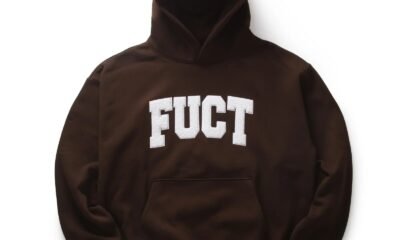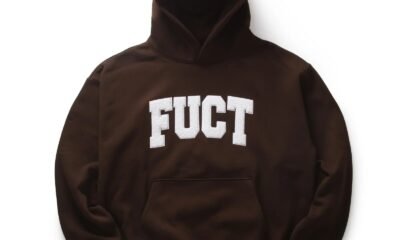Bollywood & TV
FUCT clothing : The Birth of Streetwear Rebellion
In the fast-paced world of fashion, few brands manage to leave an indelible mark on culture, and fewer still achieve this while subverting mainstream norms. FUCT (Friends U Can’t Trust) is one of those rare entities. Founded in 1990 by Erik Brunetti, FUCT emerged as a rebellious force that blended streetwear, skate culture, and raw anti-establishment ethos. Over the years, it has come to represent not just a brand, but a symbol of defiance, creativity, and the punk rock spirit that challenged conventional ideals of fashion and commercialism.
Origins: FUCT’s Anti-Brand Philosophy
In the late 1980s and early 1990s, the streetwear scene was nascent, but it was largely influenced by hip-hop, surf, and skate culture. The big brands were still reigning supreme, and though there was a subculture of rebellion brewing, it wasn’t yet fully articulated in fashion. That’s where Erik Brunetti stepped in with his raw, unapologetic vision.
FUCT clothing wasn’t just a clever name; it was a statement. Brunetti’s vision was never to create a brand in the conventional sense. His designs challenged traditional marketing and brand aesthetics, adopting an anti-commercial approach from the very beginning. For FUCT, branding wasn’t about flashy logos or pandering to consumer culture. Instead, it was about critiquing it.
FUCT’s designs were subversive, politically charged, and often offensive by mainstream standards. They featured graphics that challenged the American dream, mocked corporate greed, and highlighted the dark side of consumerism. The early designs were largely inspired by 80s punk rock, skate culture, and graffiti art—elements that were familiar to Brunetti, a self-taught artist and designer who had grown up immersed in the countercultural movements of Los Angeles.
Iconic Designs: Rebellion in Every Thread
FUCT’s graphic-heavy approach set it apart from other streetwear brands. From its inception, the designs were bold, raw, and intended to provoke. Early collections featured heavy references to pop culture, politics, and historical events, but always with a critical, often cynical lens. The brand’s infamous “Vietnam” collection, for example, juxtaposed military imagery with anti-war sentiments, questioning America’s involvement in overseas conflicts while tapping into the rising anti-establishment feeling of the time.
Brunetti didn’t shy away from controversy, and his designs often invited criticism. FUCT designs sometimes appropriated imagery from global corporations and remixed them into anti-capitalist messages. This antagonistic relationship with consumerism, advertising, and mainstream media gave the brand an edge that resonated deeply with fans who were disillusioned by the status quo.
But despite—or perhaps because of—this stance, FUCT grew into a cult favorite. It wasn’t just clothing; it was wearable art that carried a message. Brunetti’s fearless designs caught the attention of youth culture, skaters, and rebels who felt the brand represented their discontent with the world around them.
The Influence of Street Culture
By the mid-90s, FUCT was no longer just a fringe brand—it was an integral part of the streetwear landscape, influencing future generations of designers and brands. As skate culture and hip-hop became more mainstream, streetwear began to blend with high fashion, and FUCT played a key role in this crossover. While many of its contemporaries started to lean towards commercialization, FUCT remained fiercely independent.
Brunetti’s commitment to staying true to the ethos of the brand meant that FUCT’s success never felt forced. The brand never compromised on its core message, even as streetwear grew into a global phenomenon. While brands like Supreme and Stüssy were enjoying widespread commercial success, FUCT maintained its underground, almost subversive reputation. It was never meant to be a mass-market brand—it thrived on its exclusivity and its ability to provoke.
Even as it became more widely recognized, FUCT never lost its edge. Erik Brunetti’s refusal to be boxed into the traditional fashion industry mold allowed the brand to maintain an authenticity that resonated with die-hard fans.
Legal Battles: A Fight for Free Expression
One of the most significant moments in FUCT’s history came not from a collection or a design, but from a legal battle that spanned years. In 2011, Erik Brunetti applied to trademark the name FUCT, but the U.S. Patent and Trademark Office (USPTO) rejected the application on the grounds that the brand’s name was considered “immoral” and “scandalous.”
What followed was a lengthy legal dispute that culminated in a landmark Supreme Court case. In 2019, the Court ruled in Brunetti’s favor, stating that the prohibition on registering “immoral or scandalous” trademarks violated the First Amendment. This victory wasn’t just for Brunetti and FUCT, but for artists, designers, and creators everywhere. It was a win for free speech, solidifying FUCT’s place not just in the fashion world but in the annals of cultural history.
The case was emblematic of the brand’s entire philosophy: challenging authority, questioning societal norms, and pushing boundaries in the name of creative expression. For Brunetti, the fight wasn’t just about the brand’s name, but about defending the right to free artistic expression in the face of censorship.
FUCT Today: A Lasting Legacy
Over three decades since its inception, FUCT continues to be a beacon of countercultural influence. Though streetwear has become increasingly commercialized, with many brands adopting a more polished, corporate aesthetic, FUCT remains raw, authentic, and rebellious. It serves as a reminder that fashion, at its core, can be a form of resistance.
Erik Brunetti has always been more concerned with creating art than building a fashion empire. This is evident in the way FUCT operates today. It doesn’t adhere to traditional seasonal drops or trends; instead, it releases limited runs of products, often infused with the same satirical, politically charged commentary that first put the brand on the map.
FUCT’s influence can be seen in the numerous streetwear brands that have followed in its footsteps, adopting similar anti-commercial stances or incorporating politically charged messages into their designs. But few, if any, have managed to capture the raw, unfiltered energy that FUCT has maintained for over 30 years.
Conclusion
FUCT is more than just a clothing brand; it’s a symbol of defiance. From its anti-commercial beginnings to its legal battles with the U.S. government, FUCT has consistently pushed against societal norms and paved the way for future generations of streetwear brands. Erik Brunetti’s vision of challenging authority, critiquing consumerism, and embracing subversive art remains as powerful today as it was in 1990. In a world where fashion is often driven by trends and profit, FUCT stands out as a reminder that true creativity and rebellion can never be commercialized.





















